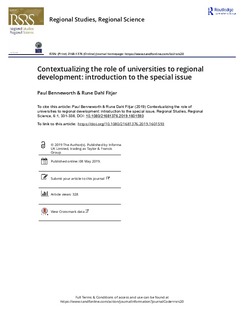| dc.contributor.author | Benneworth, Paul | |
| dc.contributor.author | Fitjar, Rune Dahl | |
| dc.date.accessioned | 2019-10-17T09:19:43Z | |
| dc.date.available | 2019-10-17T09:19:43Z | |
| dc.date.created | 2019-05-09T15:05:53Z | |
| dc.date.issued | 2019-03 | |
| dc.identifier.citation | Benneworth, P., Fitjar, R.D. (2019) Contextualizing the role of universities to regional development: introduction to the special issue. Regional Studies, Regional Science. 6(1), pp. 331-338. | nb_NO |
| dc.identifier.issn | 2168-1376 | |
| dc.identifier.uri | http://hdl.handle.net/11250/2622727 | |
| dc.description.abstract | Universities are increasingly expected to provide contributions to regional innovation and economic development processes. Despite much work on how universities can contribute to regional growth processes, there is much less consideration about why universities might choose to engage in regional development. Even though they may receive public funding, universities have no specific duty to engage, and together with recent pressures to internationalize, university regional engagement activities face tensions from these delocalization pressures. This special issue explores four ways in which universities negotiate these tensions in ensuring that their globally focused knowledge creation activities supports local innovation. First, universities can contribute to labour market upskilling, but where there are substantive problems associated with the absorption of those graduates on both the supply and demand sides, there be mismatch and even graduate underemployment. Second, world-class academics may contribute to host regions’ innovation networks, but this depends on local industries’ research and development geography, on individual academics’ motivations as well as highly skilled researchers’ willingness to stay in one region. Third, universities can steer and support academics towards regional engagement, but they risk engagement activities being exclusively oriented towards what high-level strategic actors believe to be important. Finally, universities can raise the quality of regional innovation strategy processes and create collective innovation assets, but are reliant upon grass-roots-change agents that might not necessarily be visible to strategic managers. A better understanding of these four tensions is necessary to deliver practical improvements to university contributions to smart, social and sustainable regional development. | nb_NO |
| dc.language.iso | eng | nb_NO |
| dc.publisher | Informa UK Limited (Taylor & Francis) | nb_NO |
| dc.rights | Navngivelse-Ikkekommersiell 4.0 Internasjonal | * |
| dc.rights.uri | http://creativecommons.org/licenses/by-nc/4.0/deed.no | * |
| dc.subject | universiteter | nb_NO |
| dc.subject | økonomi | nb_NO |
| dc.subject | regionstudier | nb_NO |
| dc.title | Contextualizing the role of universities to regional development: introduction to the special issue | nb_NO |
| dc.type | Journal article | nb_NO |
| dc.type | Peer reviewed | nb_NO |
| dc.description.version | publishedVersion | nb_NO |
| dc.rights.holder | © 2019 The Author(s). | nb_NO |
| dc.subject.nsi | VDP::Social science: 200::Economics: 210 | nb_NO |
| dc.source.pagenumber | 331-338 | nb_NO |
| dc.source.volume | 6 | nb_NO |
| dc.source.journal | Regional Studies, Regional Science | nb_NO |
| dc.source.issue | 1 | nb_NO |
| dc.identifier.doi | 10.1080/21681376.2019.1601593 | |
| dc.identifier.cristin | 1696733 | |
| cristin.unitcode | 217,14,1,0 | |
| cristin.unitname | Avd. for innovasjon, led. og mark.føring | |
| cristin.ispublished | true | |
| cristin.fulltext | original | |
| cristin.qualitycode | 1 | |

